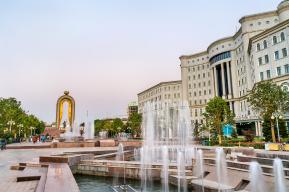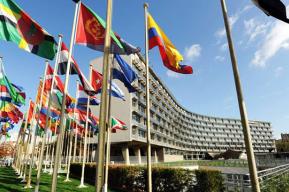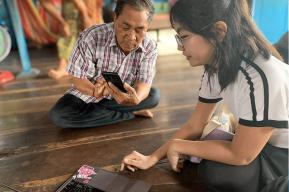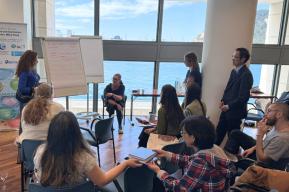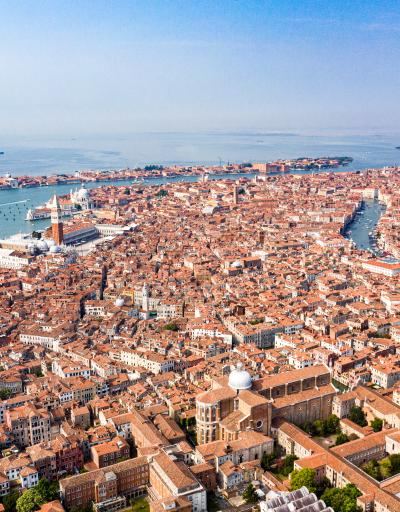
News
Urgent appeal to action on water scarcity at ‘The water resource: from the Dolomites to the sea – 2023 edition’
Water scarcity is a challenge that affects ecosystems all around the world, but particularly in mountain environments where rising temperatures are a serious threat; effects such as melting glaciers, diminishing snow cover during winter months and extreme weather phenomena are intensifying. It is therefore imperative not only to study the evolution of mountain areas over time, but also to raise awareness on the value of water resources. Priority must be given to making progress towards SDG 6 of the 2030 Agenda for Sustainable Development, which aims to ensure access to clean water and sanitation for all.
The 2022 edition of ‘The Water Resource: from the Dolomites to the sea’ focused on the need to promote sustainable water management. Led by the Municipality of Venice, this year’s edition was held over 3 days under the theme ‘adaptation synergies’, bringing together experts, scientists and academic professionals to discuss best practices and possible ways to adapt to water-related challenges. Collaboration and cooperation are key steps towards preserving this precious resource.
Among the co-organisers of the event were: UNESCO Regional Bureau for Science and Culture in Europe; Institute of Marine Sciences of the National Research Council of Italy (CNR-ISMAR); Club Alpino Italiano (CAI); CAI Mestre branch; Fondazione Dolomiti UNESCO; Teatro La Fenice; Europe DIRECT Venezia Veneto; Consorzio di Bonifica Acque Risorgive; and, Consorzio dei Comuni del Bacino Imbrifero Montano del Fiume Piave for the province of Venice.
The event was hosted at the Rifugio Galassi - Città di Mestre, a mountain lodge located in the heart of the Dolomites, a UNESCO World Heritage site. The area has been progressively affected by the depletion of its main water source, the Lower Antelao Glacier, which has diminished at a steady rate since 1981, making it a fitting laboratory for water resource management and possible solutions.
The urgency to act on protecting our water resources has never been greater. Our decisions and actions today will shape the world we leave for future generations. Let us be guided by the wisdom of collaboration, and the understanding that the responsibility to protect our water resources rests upon each and every one of us.
After a two-hour hike, participants of the 3-day workshop reached the Rifugio Galassi on 29 June. Luigi Brugnaro, Mayor of Venice and Ana Luiza M. Thompson-Flores, Director of the UNESCO Regional Bureau for Science and Culture in Europe and UNESCO Liaison Office in Geneva opened the event with video messages; Renato Frigo, President of CAI Veneto and, Alessandro Bonaldo, President of CAI Mestre branch also participated in the opening. The event convened 22 participants from national and local institutions, and the 4 main sessions covered topics from perspectives on water management to monitoring climate change effects on mountain environments and adaptation strategies.
The first session regarding local and international perspectives underlined the need for urgent action in the pursuit of SDG 6. Across all scales, institutions need to strengthen collaboration to join forces and work towards the same objectives. In this process, communication plays a crucial role, and scientists must work to better inform communities with methods that can give people hope for a sustainable future.
Steps have already been taken by UNESCO to educate youth on ocean literacy and the value of water in our everyday lives. On the second day, a session discussed the impact of climate change on water resources, with particular attention to the ongoing project ‘Kindergarten of the Lagoon’. Since 2022, the project adopts a method that uses outdoor education and interactions with the surrounding environment to stimulate learning and create new connections with the natural and cultural heritage of the Venetian Lagoon.
The water crisis cannot be solved on a local scale, it must be addressed on a wider scale, with a transboundary vision and participation. A collective effort is therefore necessary, leaving aside any disagreements or differing visions, to pursue adaptation goals.
Much more remains to be done in relation to water scarcity and adaptation strategies. Following a holistic approach has now become a crucial requisite for water management and protection, from coastal to mountain environments.
Antonio Andrich, Director of the ‘Parco Naturale delle Alpi Giulie’, managing body of the Julian Alps UNESCO Biosphere Reserve, provided examples of how protected areas can promote sustainable water management and encourage efforts from all stakeholders, mainly through community engagement and promotion of a balance between people and their environments, through the Man and the Biosphere (MAB) Programme.
The event was a crucial step in encouraging multiple stakeholders to collaborate, develop synergies and co-create solutions to face the challenge of water scarcity using a source to sea approach. More case studies need to be analysed and scaled up across South-East Europe and the Mediterranean in order for stakeholders to join forces and find common solutions.


